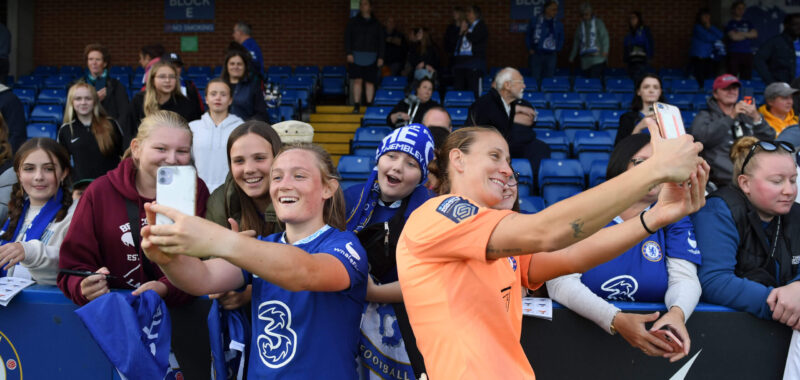Inevitable or avoidable? The consensus suggests the former, but in any case the Women’s Super League was overdue a reckoning with over-enthusiastic fans who became dangers in their scramble for photos and autographs at matches.
Chelsea have become the first WSL club to announce its players will stop meeting supporters at Kingsmeadow, saying in a statement that doing so is “no longer safe or sustainable”. The seven-time WSL champions added that incidents last season “led to concerns about the safety and security of both supporters and players, largely due to the rising numbers who are seeking signatures and selfies before and after games”, and promised instead to host organised meet-and-greets away from matches.
Will others follow? No one would be surprised if they did. Since England’s Euros win in 2022 turned WSL players into veritable celebrities, the post-match frenzy for autographs has reached fever pitch. The Athletic heard last season from fans who had been injured when supporters rushed towards the players at the final whistle. Others claimed to have witnessed fans jumping on players’ cars to force their idols to stop.
We knew life in the women’s game would be different after that summer but watching it all unfold has felt strange. Crowds were expected to swell, but those interactions between fans and players thereafter rarely felt as good-natured as they had before. There was a more transactional, slightly desperate tinge to them; a sense that the fans, in paying for entry, were owed and entitled to players’ time and attention. One line in the statement from the Chelsea Women Supporters’ Group made for particularly bleak reading: “Players are getting unnecessary abuse if they don’t stop (to mix with fans).”
Where did that feeling come from? The stratification of the football pyramid since the birth of the Premier League in 1992 has long placed its biggest stars beyond reach. By contrast, the women’s game won acclaim for making its players accessible, to the point where this became a fundamental part of the WSL. The more ardent fans became known to players’ families and all would travel and sit together. Bristol City’s Emily Syme cited it as one reason City were able to attract the highest crowds outside the top four in the WSL last season despite losing 18 of their 22 matches. The most saddened voices on social media are those upset that their children will no longer get the chance to meet the players who inspire them. This was the only realm in which their celebrity heroes passed within touching distance.

Manager Jonas Eidevall and his Arsenal players regularly mix with fans (Alan Walter – Arsenal FC via Getty Images)
Last season, though, felt like a step beyond all that, and felt divorced from the actual culture of the women’s game. Kids and their parents sketched out signs pleading for players’ shirts and boots without understanding that those players didn’t have spares to give away and, in some cases, still paid for their own boots. Clearly, parents know the women’s game differs from the men’s — queuing for selfies would be fruitless otherwise — but do not then comprehend the attendant financial disparities. And instead of using that rejection as teachable moments — how shameful, they might say, that these players still have to pay for their own boots just because they’re women — evidently there was outrage when players did not comply.
Social media will have played its role — the virality of the more tender interactions between fans and players of course makes children desperate to emulate them — but there is also a wider social expectation here. There is no real bar for male players, who routinely enter and leave matches with their headphones and without eye contact. Female players, meanwhile, must be always some degree of obliging and happy. But not too sociable, mind, if you’ve just lost, because then social media will think you’re not taking the whole thing seriously. Such is life when you must carry responsibility for the whole sport’s reputation in the way few male players ever have to.
There has always been a subset of women’s football fans who have never felt comfortable with the post-match meet and greets. Going to a game purely to meet the players, they argue, devalues the sport itself. Over the next few seasons, more and more WSL clubs will have to grapple with just how critical those interactions are, and whether the league, with the help of a more lenient and forgiving fanbase, can find a way to preserve the purer aspects of women’s football without this kind of chaos.
(Top photo: Harriet Lander – Chelsea FC/Getty Images)

